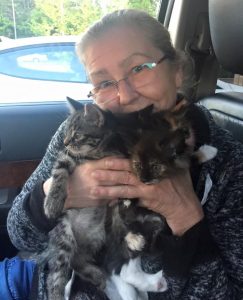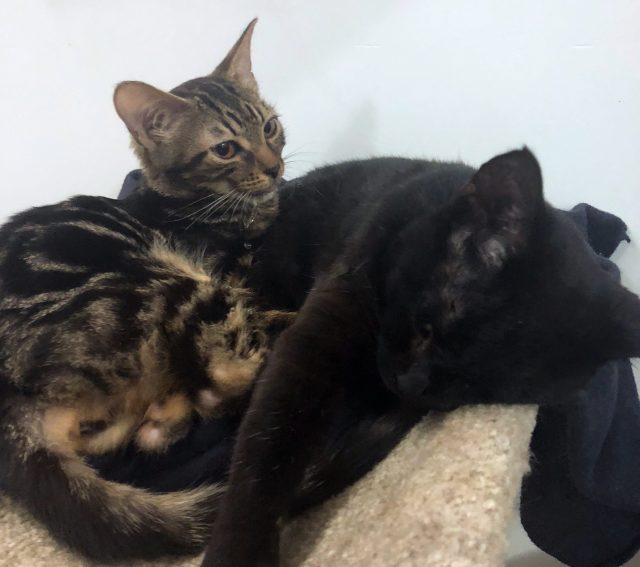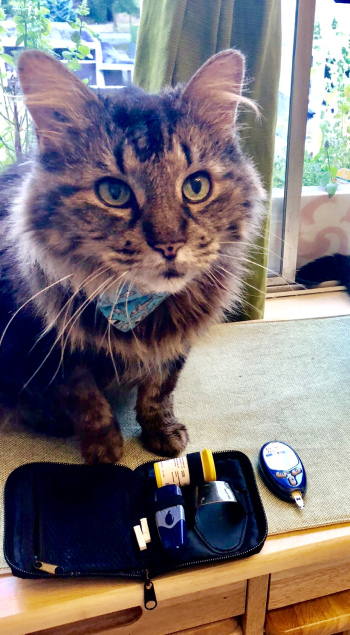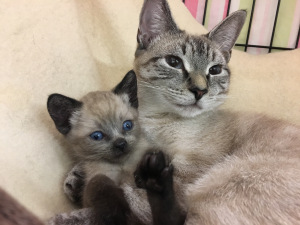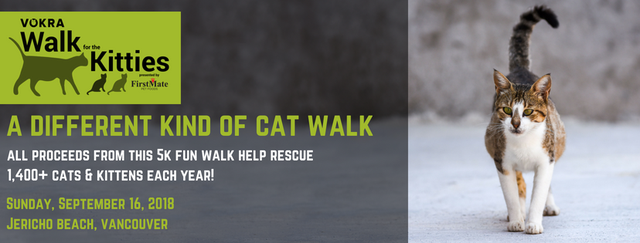 Would-be cat parents Ella and Mario de Torres were scanning the VOKRA blog when they came across an Adopt Me article featuring two cute kitties in search of a forever home. After a quick read, Ella and Mario realized they’d found their cats! Soon Trixie (now Sushi) and her son Mike (now Kimchi) were on their way to a new place.
Would-be cat parents Ella and Mario de Torres were scanning the VOKRA blog when they came across an Adopt Me article featuring two cute kitties in search of a forever home. After a quick read, Ella and Mario realized they’d found their cats! Soon Trixie (now Sushi) and her son Mike (now Kimchi) were on their way to a new place.
There was no doubt in Ella and Mario’s minds they’d made the right choice. In their foster home the two cats were coming out of their respective shells, with the small mom meowing chattily and her son showing a marked fondness for pats and playtime with strings and sticks.
 But now after eight months with Ella and Mario, Sushi and Kimchi are showing their true and adorable colours. Ella has many “meow-versations” with chatty Sushi. “She sounds like a trilling pigeon!” said Ella.
But now after eight months with Ella and Mario, Sushi and Kimchi are showing their true and adorable colours. Ella has many “meow-versations” with chatty Sushi. “She sounds like a trilling pigeon!” said Ella.
At first, though, Sushi needed a bit of time to get used to her new home. Ella describes the first few months as being “like a cha-cha – we’d feel like we were making progress, but then something would spook her and she’d be back to hiding again.” One such spook happened early on when Sushi’s small paw stepped on a remote control that operated Ella and Mario’s bedroom ceiling fan. “Sushi was so frightened she wouldn’t walk past the open bedroom door!” said Ella. Fortunately, Sushi’s now settled in and has become much more confident and cuddly. In Ella’s words, “She’s a serious lap cat. There are times when I have literally just made contact with the couch and her paw is already on my thigh, demanding a lap to sit on!”
 Kimchi too has gotten braver and braver the more time he spends living with Ella and Mario. In fact, the (human!) couple have nicknamed their boy “Explorer Cat” and he continues to lives up to that name, always climbing up to a high vantage point to survey his domain. When Kimchi’s down on the ground, he’ll spend time “zooming,” as Ella put it, running around like a “crazy cat”. In true cat fashion, the zoomies often come in the early morning when Ella and her husband are happily snoozing! As you might expect from all that activity, Kimchi likes his food. In the mornings he’ll “meeeeeoooooow pitifully as if he’s starving and will continue to meow until someone opens the bedroom door,” said Ella.
Kimchi too has gotten braver and braver the more time he spends living with Ella and Mario. In fact, the (human!) couple have nicknamed their boy “Explorer Cat” and he continues to lives up to that name, always climbing up to a high vantage point to survey his domain. When Kimchi’s down on the ground, he’ll spend time “zooming,” as Ella put it, running around like a “crazy cat”. In true cat fashion, the zoomies often come in the early morning when Ella and her husband are happily snoozing! As you might expect from all that activity, Kimchi likes his food. In the mornings he’ll “meeeeeoooooow pitifully as if he’s starving and will continue to meow until someone opens the bedroom door,” said Ella.
All in all, Ella and Mario are delighted with their new snuggle bugs. And we couldn’t be happier to report yet another happy tail!
Would you like to share your Happy Tail? Email us at [email protected].
]]>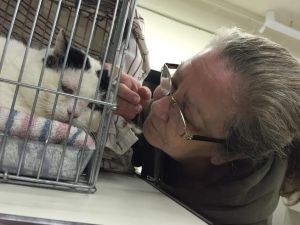 It’s hard to keep track of all the acronyms that exist these days, but in the cat rescue world TNR is a big one. TNR stands for Trap-Neuter-Return and describes the process of trapping feral cats, spaying or neutering them, and then returning them to the location they came from. According to VOKRA co-founder Maria Soroski, it’s the most effective and humane way to help control the feral cat population.
It’s hard to keep track of all the acronyms that exist these days, but in the cat rescue world TNR is a big one. TNR stands for Trap-Neuter-Return and describes the process of trapping feral cats, spaying or neutering them, and then returning them to the location they came from. According to VOKRA co-founder Maria Soroski, it’s the most effective and humane way to help control the feral cat population.
When VOKRA formed back in 2000, Maria had no idea what a feral cat was, which is hard to believe for someone who is such a strong advocate for Vancouver street cats. She, along with fellow co-founder Karen Duncan, began by bottle feeding kittens that had been brought into the SPCA before branching off on their own to create VOKRA.
“I had no idea where the kittens were coming from,” says Maria, who wondered what happened to the kittens’ moms. “I assumed they were from owned cats or that they’d been orphaned.” However, as kittens kept arriving from the same addresses, Maria and Karen started to do a little sleuthing. They soon discovered a whole world of feral cats. The mother cats hadn’t been brought in because they were wild – no one could touch them, let alone pick them up and transport them into care.
Maria discovered entire colonies, some with upwards of 50 cats. They were all the moms, dads, aunts, uncles and cousins of all the bottle-fed kittens that had come in. Thanks to the guidance of local rescuers and the resources of Alley Cat Allies, Maria quickly learned to trap and hasn’t looked back since.
VOKRA’s volunteer trappers, spearheaded by Maria, spent eight years trapping seven days a week in Vancouver and Burnaby. It’s estimated there were more than 8000 – 9000 free roaming cats in Vancouver before VOKRA came along. The number of feral cats is now down to less than 300 with the remaining colonies under control. Some of the colonies now consist solely of senior citizen cats, who pass on humanely after living a life on their own terms.
For cats that we can’t return to their original site, we try and find them another home – specifically a barn or hobby farm. Janet, who coordinates the barn cat placement program, says “It’s an alternative option for feral cats that are unable to be returned to their original location for various reasons.” The barns are located throughout the Lower Mainland, from Abbotsford to Squamish, and Janet often drives the cats to their new homes herself. Potential placements are interviewed in advance and the cats are guaranteed fresh food and water daily, along with a safe shelter area. In their new “jobs” as rodent control technicians they have a better life than they would out on the streets.
If the cats are young enough or semi-tame, then we’ll try to socialize them so we can adopt them to forever homes. “We’re not scared of hissy babies,” says Maria. Armed with gloves, towels, treats, and a whole lot of patient love, VOKRA volunteers socialize kittens in their homes. VOKRA runs workshops and provides coaching to these special families. Fosters tell us this is an immensely rewarding part of being with VOKRA. To watch a kitten or adult cat transform from an untrusting and extremely frightened creature to one that seeks out your affection with headbutts to your hand, and who purrs at the very sound of your voice, is a truly amazing experience.
 We respond to as many calls we can and trap feral cats, tame moms protecting their kittens and tame adults that are too afraid to trust humans just yet. Sometimes this involves all-night efforts and sometimes it involves walking into an abandoned house in protective gear so as not to be eaten alive by the swarms of fleas. Whatever it takes – the fate of all cats is important to us and those who were never given the chance to live a safe, indoor life deserve the best that we can give them.
We respond to as many calls we can and trap feral cats, tame moms protecting their kittens and tame adults that are too afraid to trust humans just yet. Sometimes this involves all-night efforts and sometimes it involves walking into an abandoned house in protective gear so as not to be eaten alive by the swarms of fleas. Whatever it takes – the fate of all cats is important to us and those who were never given the chance to live a safe, indoor life deserve the best that we can give them.
As a non-profit association we rely on the contributions of people like you. If you’d like to support our TNR program click here.
]]>
 Spring has come and gone, but the memories remain…
Spring has come and gone, but the memories remain…
Little Spring, the kitten we’ve been telling you about, has very sadly passed away. Her short life, and her close friendship with bestie Hamburgler, were a heart warming inspiration to us all, say many VOKRA volunteers.
“The most amazing thing about Spring was that her spirit was super strong even though her body was so very frail,” says VOKRA volunteer Susan, who spent a good deal of time with this little kitten. “In her short life she taught us to focus on the positive, make the most of what we have and love unconditionally.”
Spring was born with an inoperable genetic defect, a portosystemic liver shunt, a disorder in which a cat’s blood supply bypasses the liver, leading to increased toxins in the blood. Most kittens with this condition die within weeks of birth, so Spring’s relatively long life (she was 5 months when she passed) is an amazing tribute to VOKRA’s good care.
At first, volunteers at VOKRA’s Operations Centre weren’t sure how long this tiny kitten would be around. At a few weeks of age, Spring wasn’t thriving. She crouched in her cage, too nauseous to nibble on her food or even nudge the hands of volunteers who reached in to pet her cute self.
After a vet visit or two, she seemed to recover and our volunteers made a momentous decision. Another adorable feline had just been rescued from life on Vancouver’s streets. This cat, named Hamburgler as he was found hiding under a McDonald’s dumpster, was paired with Spring.
At first, Spring was hesitant. Following some much-needed treatments, Hamburgler had become a happy rambunctious kittie, always wanting to play. He pounced on the little kitten, delighted to spot a new playmate.
But Spring soon learned to give as good as she got. On her healthy days, she and her new bestie chased each other around. On not so good days, Hamburgler began to help his friend, supporting her through her struggles.
Susan tells how he used to help make sure Spring was getting all the attentions she needed. “I was encouraging Spring to eat by getting her to lick food from my finger. It was a bit messy so when we were finished, Hammy rushed over and gave her face a good clean!”
Hamburgler even provided comfort on Spring’s worst days, when her health problems necessitated trips to the vet.
“When Spring travelled to the vet she would cry in the car,” says Susan. “But when Hammy started to accompany her in a shared carrier she was quiet and comforted. He even accompanied her on her last journey and groomed her beforehand to ensure she was respectable before they left!”
Hamburgler now has his own happy ending. He’s been adopted by VOKRA volunteer Leanne, who kindly waited to collect her new companion until Spring was no longer in need and then rushed in so Hamburgler would not have to spend a night alone in the pod he and Spring shared.
Leanne says Hamburgler is settling well into his new home, “He’s playing and giving me all the love and licks of affection.”
Spring’s fighting spirit, and her connection with Hamburgler, will linger in our minds for a long time.
In a final message about Spring, VOKRA co-founder Maria had this to say: “No matter what cards you are dealt, you can walk through life with kindness and love.”
Hamburgler says goodbye to Spring
]]> Piper (formerly Sasha) is now singing a happier tune. This little cat had a rough start to her life but luckily she’s found a home, thanks to VOKRA and her adoptive kitty-mom.
Piper (formerly Sasha) is now singing a happier tune. This little cat had a rough start to her life but luckily she’s found a home, thanks to VOKRA and her adoptive kitty-mom.
Piper and her siblings were found in a ditch, covered with fleas and lesions from the fungal skin infection ringworm. It was VOKRA and vets who stepped in to help, said Eeva Wanders, who adopted six-month old Piper.
At first, the newly healthy Piper was very shy and VOKRA recommended a quiet home for this little kitty. At Eeva’s, it didn’t take long for Piper to come out of her shell. “For all [Piper’s] shyness, she took to me quickly and on the second night she jumped into my lap,” Eeva marveled. “The next morning I woke to her lying on my stomach.”
 Eeva herself was delighted to meet Piper. Having lived with cats all her life, Eeva suddenly found herself alone and lonely after the death of her beloved Cairo. “I missed him terribly,” she said. “And I knew only a cat could help.”
Eeva herself was delighted to meet Piper. Having lived with cats all her life, Eeva suddenly found herself alone and lonely after the death of her beloved Cairo. “I missed him terribly,” she said. “And I knew only a cat could help.”
Happily, Piper was there to fill this cat-shaped hole. Eeva says that even Piper’s markings seemed fortuitous. “I had hoped to find a silver tabby with a pink nose as I had one growing up. Lo and behold, there she was!”
Now, after six years together, Eeva and Piper are still very much enjoying each other’s company. The formerly shy Piper is “quite comfortable and curious of people and is keen to sniff their hair or ears,” said Eeva. “She LOVES to play and investigate boxes and paper bags. She loves her grey mouse, her felted braids and milk jug rings. And she plays fetch…but only when she wants to.”
 “She truly is an amazing and special cat,” Eeva said, “I’m glad to be owned by her.”
“She truly is an amazing and special cat,” Eeva said, “I’m glad to be owned by her.”
We’re glad, too, that Piper and Eeva have found each other and that Piper now has a forever home where she can be happy!
Would you like to share your Happy Tail? Email us at [email protected].
]]> The rains have arrived and it’s time for all kitties to come in out of the cold. Here at the VOKRA, we work hard everyday to make sure cats who have no place to go have a roof over their head when the weather takes a turn.
The rains have arrived and it’s time for all kitties to come in out of the cold. Here at the VOKRA, we work hard everyday to make sure cats who have no place to go have a roof over their head when the weather takes a turn.
Until recently, if you called “here Kitty Kitty” at our Operations Centre you’d have probably been talking to a single cat, an elderly gentleman named (you guessed it) Kitty Kitty.
This poor guy wouldn’t come running in answer though, as he has several age-related conditions that affect his mobility. He’s hyperglycemic and has arthritis in the lower part of his spine. When Kitty Kitty first came to VOKRA he couldn’t walk very well and our volunteers were concerned he was in a lot of pain. Everyone worked hard to find Kitty Kitty the right meds to help him move more comfortably.
Unfortunately, to make matters worse, Kitty Kitty started out not too relaxed in his temporary home and he had a tendency to nip. But after some medical care, and lots of cuddles and chin scratches from the team at Ops, Kitty Kitty started feeling much better. He’s still not the most agile of kitties, but he’s getting around and any volunteer or visitor who came to the back room where Kitty Kitty was staying was sure to be greeted by hopeful eyes and a little paw reaching out.
After Kitty Kitty’s temporary stay, he’s happier and healthier and has now moved on to a new home. Everyone will miss this super senior, but we’re glad we were able to ensure Kitty Kitty stayed warm, dry and loved while he was waiting for a permanent situation to come along.
If you’d like to help us help more kitties like Kitty Kitty, please donate today at www.givetovokra.ca.
]]> Nicole and her partner Bayani weren’t considering adopting another cat after their beloved 16-year-old tabby passed away. Even though she was still grieving, Nicole could see how her other cat Lex needed a friend. After a colleague showed her a picture of little Lincoln on our website, she couldn’t help but consider bringing another kitty into her home.
Nicole and her partner Bayani weren’t considering adopting another cat after their beloved 16-year-old tabby passed away. Even though she was still grieving, Nicole could see how her other cat Lex needed a friend. After a colleague showed her a picture of little Lincoln on our website, she couldn’t help but consider bringing another kitty into her home.
“I was pretty sure when I had seen his photo but it sealed the deal as soon as I met him in person,” said Nicole. “Out of all the kittens I had an instant bond with him…he came right up to me and curled up on my lap and fell asleep! My heart instantly melted!”
 Before long, Lincoln became the newest member of Nicole’s household. Slow introductions are advised when introducing a new cat into a home, especially when there’s a kitten coming into a senior cat’s domain. It was hard for Nicole to keep Lincoln separate for those few days, but once he had access to the house he wasted no time making himself right at home.
Before long, Lincoln became the newest member of Nicole’s household. Slow introductions are advised when introducing a new cat into a home, especially when there’s a kitten coming into a senior cat’s domain. It was hard for Nicole to keep Lincoln separate for those few days, but once he had access to the house he wasted no time making himself right at home.
Nicole and Bayani quickly learned life with a kitten is a lot different than with a senior cat. “My other cats have always been well behaved and not as playful so it’s definitely been challenging keeping up with him!” she said. “Lincoln has a serious case of the ‘zoomies’, so he constantly runs laps around the house. He’ll even leap at doors and run across walls. It’s crazy!”
 Lincoln enjoys many comforts in his new home, such as a box full of kitty toys and endless belly rubs and cuddles. By far his biggest quirk is his love for water. He always comes quickly when he hears water running and will even jump in the shower! Lincoln’s also obsessed with people food – especially chicken. Nicole and Bayani have to keep an eye on him when they’re cooking and now have a good system of covering ingredients – but Lincoln still manages to sneak off with a nibble from time to time!
Lincoln enjoys many comforts in his new home, such as a box full of kitty toys and endless belly rubs and cuddles. By far his biggest quirk is his love for water. He always comes quickly when he hears water running and will even jump in the shower! Lincoln’s also obsessed with people food – especially chicken. Nicole and Bayani have to keep an eye on him when they’re cooking and now have a good system of covering ingredients – but Lincoln still manages to sneak off with a nibble from time to time!
Lincoln’s high energy and big personality have brought a light to Nicole, Bayani and even feline big brother Lex’s life. “Lincoln has a lot of the same traits and habits as my cat Cedes who passed so I really connect with him. His big personality just brings constant happiness every day,” said Nicole. “He’s just really silly and we honestly couldn’t imagine life without him!”
Thank you to Nicole and Bayani for giving a loving home to a kitty in need!
Would you like to share your Happy Tail? Email us at [email protected].
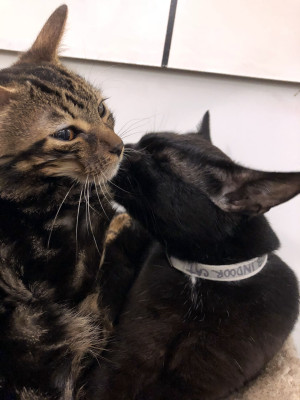 Fall?! Not at our Operations Centre. It’s still springtime at Ops! Spring, the kitten we first told you about last month, has had her ups and down, but the good news is she’s found a special friend.
Fall?! Not at our Operations Centre. It’s still springtime at Ops! Spring, the kitten we first told you about last month, has had her ups and down, but the good news is she’s found a special friend.
Little Spring is still getting her share of human attention, as our staff and volunteers continue to help her with her troublesome kidneys. But now Spring has some kitty love too! Her new ‘bestie’ and health helper is Hamburgler, an eight-year old cat rescued by VOKRA back in June of this year.
Like Spring, Hamburgler had a bit of a rough time before VOKRA came into his life. As one of Vancouver’s many stray cats, Hamburgler was often hungry and sick. When VOKRA volunteers found him, he was crouched under machinery in a shed behind a MacDonald’s restaurant, covered in fleas and with a serious infection in one eye.
Both Spring and Hamburgler ended up at our Ops Centre where they’re getting the care and love they need, and then someone had a bright idea. The health of both cats was stabilizing, but they seemed lonely. Why not room them together?
At first, Spring wasn’t sure what to make of her new stepbrother. But Hamburgler immediately started nudging her to play and soon brought her out of her shell. It wasn’t long before the pair were tossing toys around, touching noses and snuggling up together.
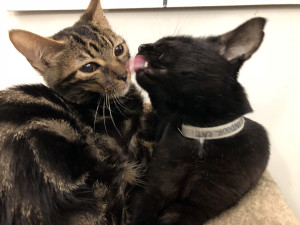 The sight of the happy twosome cuddled on a cat tree is one of the highlights of a shift at Ops for many a volunteer and staff member. The coming months may still bring some cold weather for these kitties. Spring is not entirely well and most recently she took another bad turn requiring yet another emergency trip to the vet. She will be returning for another vet visit soon for an ultrasound as we continue to diagnose her issues. And Hamburgler could have more problems due to his years on the streets. But for now they keep each other warm with the help of everyone at VOKRA and each other.
The sight of the happy twosome cuddled on a cat tree is one of the highlights of a shift at Ops for many a volunteer and staff member. The coming months may still bring some cold weather for these kitties. Spring is not entirely well and most recently she took another bad turn requiring yet another emergency trip to the vet. She will be returning for another vet visit soon for an ultrasound as we continue to diagnose her issues. And Hamburgler could have more problems due to his years on the streets. But for now they keep each other warm with the help of everyone at VOKRA and each other.
Spring and Hamburgler are just two of the thousands of reasons why we Walk for the Kitties.
Each year, VOKRA rescues more than 1,400 homeless cats and kittens from around the Lower Mainland. Unlike many other animal rescue groups, VOKRA is a volunteer-driven, no-kill organization. Our work is made possible through the generous support of volunteers, adopters and people like you.
Medical care accounts for more than 50% of our annual budget. Without your support we wouldn’t be able to afford to rescue all these cats and kittens.
Walk for the Kitties is our largest fundraising event of the year. This 5k fun walk takes place at Jericho Beach and all funds raised go directly towards supporting our rescue efforts. Learn more here.
Can’t make it on September 16? You can still donate today!
]]>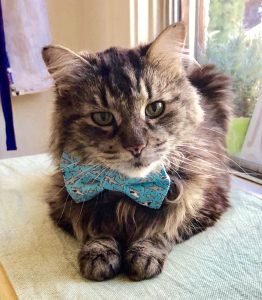 Rachel and her partner Chris already had three cats and were not looking to adopt another when they sat down to read the VOKRA newsletter together earlier this year. Living with Type 1 diabetes herself, the article on Timmy, an older male Maine Coon with diabetes, really resonated with Rachel. In fact, one of her previous cats also had diabetes so she was familiar with how to care for a diabetic cat. However, they were already short on space and were confident Timmy would find a forever home soon.
Rachel and her partner Chris already had three cats and were not looking to adopt another when they sat down to read the VOKRA newsletter together earlier this year. Living with Type 1 diabetes herself, the article on Timmy, an older male Maine Coon with diabetes, really resonated with Rachel. In fact, one of her previous cats also had diabetes so she was familiar with how to care for a diabetic cat. However, they were already short on space and were confident Timmy would find a forever home soon.
Several months later another VOKRA email arrived in Rachel’s inbox featuring Timmy front and centre. Once again Timmy’s story was used to highlight how your donations to VOKRA are used to care for special kitties in need. Rachel’s heart went out to Timmy and, after convincing Chris, she contacted VOKRA to arrange a meeting.
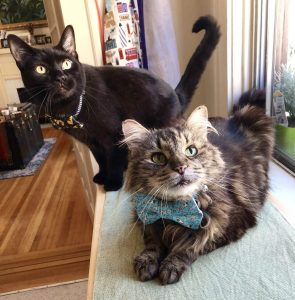 Visiting Timmy at his foster home (only five blocks from her own!), Rachel was able to review his lengthy medical files. It turns out Timmy had been a struggling diabetic without a permanent home for nearly seven years. Furthering her bond with him, Rachel learned Timmy was on the same insulin and required the same glucose checks as she did. Despite her concerns that adopting Timmy into their happy three cat home could potentially disrupt the other cats’ lives, Rachel knew the value of giving Timmy the opportunity for a happy, stable home overshadowed the risks. Rachel and Chris decided to take the plunge and take Timmy home.
Visiting Timmy at his foster home (only five blocks from her own!), Rachel was able to review his lengthy medical files. It turns out Timmy had been a struggling diabetic without a permanent home for nearly seven years. Furthering her bond with him, Rachel learned Timmy was on the same insulin and required the same glucose checks as she did. Despite her concerns that adopting Timmy into their happy three cat home could potentially disrupt the other cats’ lives, Rachel knew the value of giving Timmy the opportunity for a happy, stable home overshadowed the risks. Rachel and Chris decided to take the plunge and take Timmy home.
The first thing Rachel and Chris did when they adopted Timmy was to change his name to Louie. Shortly prior to his adoption, it was discovered that Louie needed emergency surgery to remove his teeth. The recovery was difficult for an older diabetic cat like Louie and developed pancreatitis. After a few close calls and attentive care from Rachel and Chris, Louie pulled through.
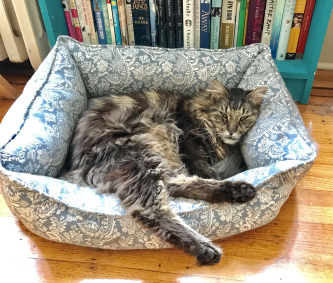 It took a month for all three cats to come around but Louie has now been accepted as part of the clowder. Louie’s a lover of all people food but is kept on a strict diet and schedule to manage his diabetes (even though Chris sneaks him a tiny taste here and there!). In fact, Louie’s diabetes has improved since his adoption and he now requires less daily units of insulin to manage his glucose levels.
It took a month for all three cats to come around but Louie has now been accepted as part of the clowder. Louie’s a lover of all people food but is kept on a strict diet and schedule to manage his diabetes (even though Chris sneaks him a tiny taste here and there!). In fact, Louie’s diabetes has improved since his adoption and he now requires less daily units of insulin to manage his glucose levels.
Since Rachel treats her own diabetes she quickly accepted Louie’s needs as part of her routine. “I think, if anything, taking care of him has left me feeling like I’m not alone,” said Rachel. “It never felt to me like I was taking on too much more, but rather I was gaining someone who was helping me deal with my depression around diabetes. A support buddy!”
Thank you so much to Rachel and Chris for giving Louie the loving home he’s been waiting for. We wish you all many happy years together!
Would you like to share your Happy Tail? Email us at [email protected].
]]>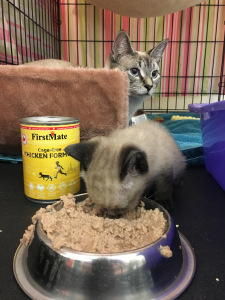
Little Nugget enjoying a snack
At VOKRA, we do our best to ensure all kitties who pass through our doors live the best lives they can. That’s why when we come across issues we always look for a pattern and try to find a solution.
Unfortunately, from time-to-time cats are returned to us due to behavioural issues, and the most common of these issues is peeing outside of the litter box. More times than not, the root cause is diet and stems from the fact the cat is fed primarily dry food.
Cats who eat mostly dry food also tend to have more urinary tract infections. And cats that are free fed, which is when food is left out for the cat to self-monitor their own diet, have it even worse as they’re often fat so they can’t clean themselves properly.
So, why is dry food the culprit?
Cats are designed by nature to be carnivores and their digestive tract, despite thousands of years of domestication, is not intended to assimilate dry food. Not only so, contrary to popular belief, dry food causes plaque to form on teeth. It’s also highly processed, making the body work anywhere from 12-18 hours to break it down. This means the cat is always half full and in a constant state of digestion. On the other hand, raw food moves through the body within four hours, while wet food takes 8-12 hours for the body to metabolize it.
Karen Duncan, co-founder of VOKRA, has fed a raw diet to all of her animals for more than 20 years and fully recommends a wet or raw diet for all kitties. At VOKRA, FirstMate is our first choice for the cats in our care and Karen explains why:
“We got involved with FirstMate a few years ago. They’re a local company, which beats buying masses of food shipped from the US. Every product is cruelty free as the protein is sourced ethically – all wild salmon and tuna, never farmed. There’s never any guar gum or thickeners. Instead, potatoes or peas are used. Their packaging is also epoxy free and the label is foil laminate, making everything recyclable. VOKRA’s very confident of the quality of FirstMate food and are able to get answers quickly from them if any arise.”
All of these reasons are why we feel so strongly about feeding cats a diet that primarily consists of wet or raw food.
So if your kitty is peeing outside of the box, has frequent urinary infections or stinky breath it will most likely be worthwhile for you to switch their diet away from dry. It will help save their health and will cost you less trips to the vet.
If you’d like to learn more about why wet is best click here.
]]>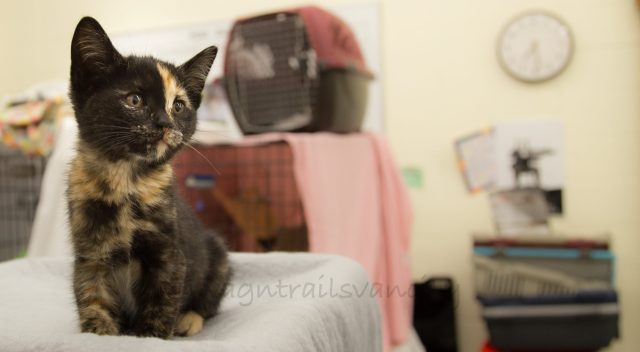 Kittens, kittens and more kittens.
Kittens, kittens and more kittens.
 Kitten season may be the cutest time of the year, but it means a lot of extra costs and work for us here at VOKRA. Each year during kitten season we care for more than 600 kittens, and this year’s no exception.
Kitten season may be the cutest time of the year, but it means a lot of extra costs and work for us here at VOKRA. Each year during kitten season we care for more than 600 kittens, and this year’s no exception.
As a volunteer-driven non-profit, we count on your support to be able to rescue so many kittens.
Kittens in our care have a chance at a happy, safe and healthy life. Kittens like these cuties who were found living at an industrial site out in Abbotsford. These little guys were lucky enough to be trapped by our dedicated volunteers and will now spend the rest of their lives in loving homes.
And, by taking these kittens off the streets and ensuring they’re spayed and neutered, we’re also breaking the cycle preventing more unwanted kittens from being born. It doesn’t take very long for five kittens to become 35, and for 35 kittens to become 105 and so on.
Kittens like these are just five of the thousands of reasons why we Walk for the Kitties.
Each year, VOKRA rescues more than 1,400 homeless cats and kittens from around the Lower Mainland. Our work is made possible through the generous support of volunteers, adopters and people like you.
Walk for the Kitties is our largest fundraising event of the year. This 5k fun walk takes place at Jericho Beach on September 16 and all funds raised go directly towards supporting our rescue efforts. Learn more here.
Without your support we wouldn’t be able to afford to rescue all these cats and kittens.
Please help this September 16 by joining us for Walk for the Kitties, presented by FirstMate.
Can’t make it on September 16? You can still donate today!
]]>
